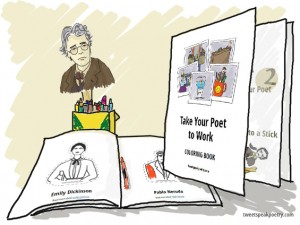From the Publishers of How to Read a Poem
For librarians, teachers, group leaders: we have teaching tools that will make it easier for you to plan your poetry and writing programs—including poetry prompts, poetry infographics, poem analyses, a beautiful poem a day, and a poets coloring book.
Visit our main poetry site to pick up these unique classroom tools!
Here’s a sample before you get there:
Smart Fun Poets Coloring Book
Our Take Your Poet to Work Day coloring book is made for grownups who appreciate a little smart fun. But you can borrow it for your classroom or library. We’re pretty sure the grownups will share.
Download the FREE poets coloring book now!
5 Great Ways to Organize Your Poetry Unit
There are various ways to engage in teaching poetry. Your poetry unit can be organized by form, by theme, or even by the main features that make great poetry work.
Check out these 5 great ways to organize your poetry unit!
How to Write a Form Poem
Looking for a poetry handbook to spark your imagination and guide you in the pleasures of writing poetry with heart and soul?
Explore this inspiring “workshop in a book.” No matter your level, you can make poems that express more deeply and impact more richly. Poems to keep. Poems to share.
From the author of How to Read a Poem and How to Write a Poem, comes a truly delightful book on how to write poetry in form. Tania Runyan’s previous How to Write a Poem focused on free verse. It covered the powerful techniques of poetry writing: image, sound, line breaks, surprising insights, risk-taking, revision strategies. It also provided practical resources to get your poems published. This companion book builds on How to Write a Poem, revealing the world of classic and new poetry forms, to help you grow and explore more.
How to Write a Form Poem covers 10 fabulous forms—sonnets, sestinas, haiku, villanelles, pantoums, ghazals, rondeaux, odes, acrostics (the real kind), found poems + surprising variations on classic forms (triolet, anyone?), to challenge you when you’re ready to go the extra mile.



